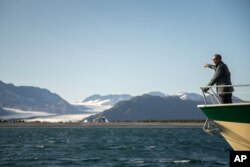A new U.N. report issued ahead of next month’s climate meeting in Paris finds that pledges to cut carbon emissions by the world's nations are a good start but fall short of what would be needed to prevent global warming and climate change.
While applauding national commitments to cut carbon gas emissions, the United Nations Environment Programme’s sixth “Emissions Gap” report, which assesses global progress on reducing greenhouse gas emissions, says effort aren't sufficient to limit the global temperature increase to two degrees Celsius this century. If all the Intended Nationally Determined Contributions (INDCs) are fully implemented, the U.N. study estimates global temperatures will rise around three degrees Celsius by 2100.
Despite the survey's discouraging conclusion, UNEP Executive Director Achim Steiner says the results convey an historic benchmark in efforts to battle climate change.
“That historic breakthrough is, simply put, the fact that we now have a commitment that you can soon describe as universal action to address the challenge of global warming and of climate change,” he said.
More than 150 countries have submitted their national climate change strategies, a number Steiner calls unprecedented and a significant departure from previous years. These national contributions cover close to 90 percent of the world’s emissions.
“What we are addressing this morning is not simply a status-quo scenario," he said. "We are beginning to bend the curve, but ... it is not yet enough. It is probably halfway toward what we do need to achieve on a longer term trajectory, which we in UNEP, based on the work of the IPCC (Intergovernmental Panel on Climate Change) still refer to as a 'net zero emissions future' somewhere in the second half of this century.”
Zero net emissions would be achieved by offsetting the amount of carbon released in the atmosphere by buying an equal amount of carbon credits to make up the difference. UNEP says the goal is to reach zero net emissions between 2060 and 2075.
The report says it will become easier and cheaper to decrease carbon emissions year by year if a low-carbon economy is put into place by 2030. Along with emission cuts, UNEP urges nations to put adaptation and mitigation measures at the forefront of efforts to tackle climate change.





